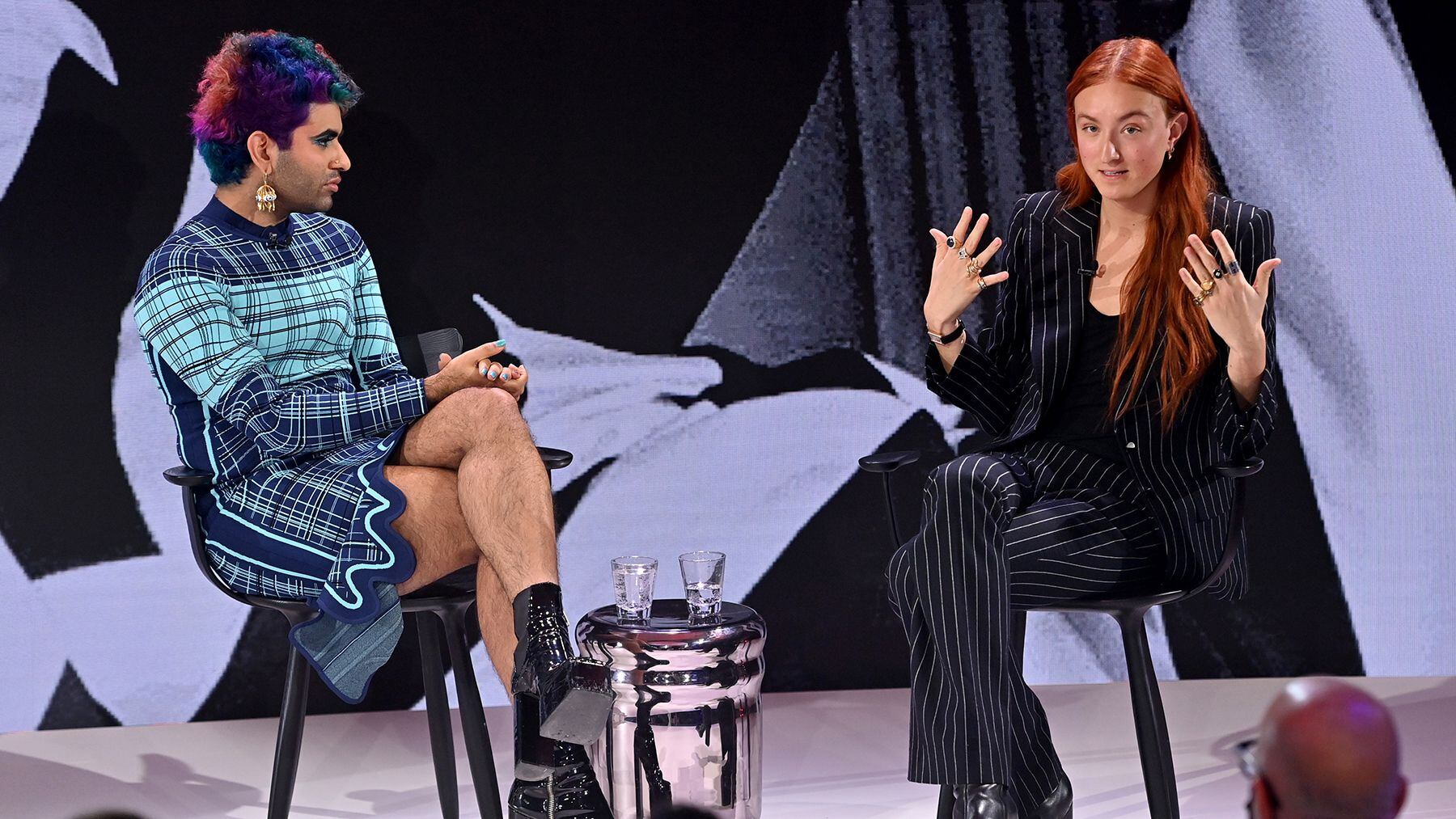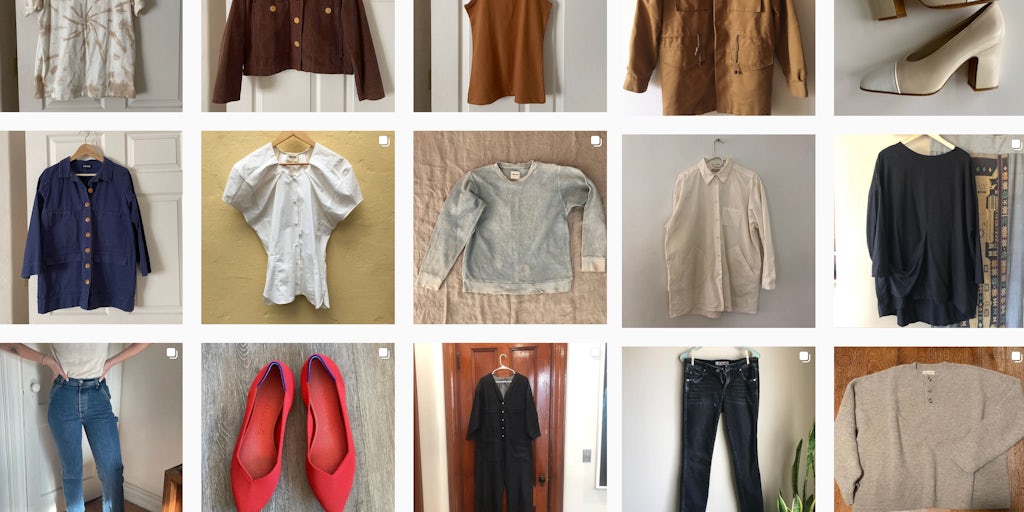VOICES 2021: The Future of Everything
The fourth session of VOICES, BoF’s annual gathering for big thinkers, set its sights squarely on the future: the future of technology, the future of cities, the future of travel, the future of work, the future of independent retail and the future of gender-free fashion. Speakers included futurists Chris Sanderson and Martin Raymond, Charter chief executive Kevin J. Delaney, mental health advocate Simone Whitehouse, Skift founder Rafat Ali, performance artist and activist Alok Vaid-Menon and designer Harris Reed.
‘The Transformative Twenties’
A faster pace of technological, climatic and demographic change are among the forces that will require individuals and companies to adapt rapidly to what futurists Martin Raymond and Christopher Sanderson called the “Transformative Twenties”
“People who think Covid is the only shock we’ll deal with in this decade are either delusional or misinformed,” Sanderson said.
Individuals are demanding more sustainable, equitable, decentralised societies, and businesses will have to become more flexible and agile to keep up with the pace of change, especially amid exploding innovation in the metaverse, he added.
“When you are building for the metaverse, build different and build better,” Raymond said. “It shouldn’t be the new normal, but the new extraordinary.”
The future of work
Since the pandemic, many have reevaluated their relationship with work, with large numbers of people leaving their jobs in what’s been dubbed the “Great Resignation.”
Workers aren’t simply opting for greater flexibility after the pandemic freed them from the confines of traditional office life. They are placing increased importance on whether the values of their employers align with their own on a host of social issues, according to Kevin Delaney, co-founder of Quartz and now the CEO of the workplace consultancy Charter.
Organisations need to challenge old structures like the five-day work-week. “A four-day work week is something we should all be considering,” Delaney said. “Firms are finding that it works for them. Employees are less burnt out, and they get as much done in four days as five.”
The current climate calls for empathetic and engaging managers who sincerely care about the well-being of employees and act as positive role models by prioritising their own wellness through simple gestures like taking breaks, working healthy hours and disconnecting for vacation.
“This is a break from the traditional leader who is hard-charging and focused on performance,” Delaney said.
The adoption of gruelling working patterns triggered by economic pressures and lengthy lockdowns is one of the most worrying effects of the coronavirus pandemic, often resulting in burnout and other forms of poor mental health.
Simon Whitehouse, a mental health advocate and CEO of the consultancy Eco-Age, gave a tearful account of he and his brother’s struggles to maintain mental health. He described a private struggle with burnout and depression — which he often kept hidden at work — as like being padlocked in a refrigerator and kicked by a giant into outer space.
“When we throw around mental health and statistics around the subject, I think it’s very, very important to realise we’re talking about human beings,” Whitehouse said.
Earlier this year, Whitehouse founded EBIT — short for “Enjoy Being in Transition” — the first brand provoking dialogue on mental health in fashion, music and art.
The future of travel
The pandemic pummelled the travel sector, which sent international arrivals plunging by 73 percent globally in 2020, according to the World Tourism Organisation. The sector continued to suffer this year, with international arrivals in Europe between January and May down 85 percent on 2019 levels.
Rafat Ali, founder of travel industry publication Skift, spoke about how continued disruptions to business travel and rising backlash to the climate impact of tourism are reshaping the sector, which is deeply intertwined with fashion sales. Services like buy-now-pay-later and the resurgence of domestic tourism are other forces at play, he added.
The future of independent retail
Retail shutdowns during the pandemic have been followed by supply chain backups this year, meaning “revenge spending” collided with continued coronavirus disruptions to production and logistics.
Shopify, the e-commerce and point-of-sale technology provider for many independent retailers, shared its birds-eye view of how small and medium-sized businesses are coping with the challenge today.
While data from the wider market, particularly big box stores, showed roughly flat sales for key Black Friday shopping, Shopify says the volume of transactions for merchants using their system was up significantly. The platform registered a 21 percent sales increase over 2020 and more than double 2019 levels, president Harvey Finkelstein said.
“We didn’t see massive declines in sales based on supply chain issues,” Finkelstein said.
Higher margins than big box stores in many cases have given independent retailers more cushion to respond quickly to supply chain and logistical challenges. The company saw 26 percent growth in merchants adopting warehouse management apps.
Other changes could be seen: independent merchants say their clients start shopping earlier this year than ever, and they shopped more fluidly than ever across online and brick-and-mortar channels. “Brick and mortar stores are becoming like fulfilment centres, while online stores can be like catalogues,” Finkelstein said.
Social shopping is surging too, with more than one third of young customers having bought products on social media. “This is actually happening,” Finkelstein said.
The future of gender-free fashion
Designer Harris Reed is one of the industry’s brightest rising stars. After breakout moments dressing Harry Styles, he dressed Iman for this year’s Met Gala, scored a major profile in The New Yorker and made a powerful fashion week debut at London’s Serpentine Gallery, cementing awareness of his gender-fluid designs.
Reed wants to see brands and retailers stop dividing selling spaces into men’s and women’s, both online and off. “It’s a fashion structure where it’s not about genders,” Reed explained.
“When it’s done right it really works,” he said, citing Black Friday sales of over $1.3 million for his partnership with jewellery brand Missoma. “That was about them really believing in me. That was building a world, not just signing my name on a collaboration.”
But while many fashion companies want to be seen working with gender non-binary people, few are baking their gender-free principles into their businesses beyond one-off collaborations.
“Companies want the aesthetics of LGBT communities but don’t really care about our lives. We’re always the moodboard,” said Alok Vaid-Menon, a writer, performer and activist who has urged the industry to ‘de-gender’ itself and reframe its definition of beauty. Brands are creating fashion for the metaverse, but still say they can’t add gender-free options to their websites, he said. “It’s crazy.”
VOICES 2021 is made possible in part through our partners McKinsey & Company, Shopify, Clearco, Klarna, Brandlive, Flannels, Snap, Getty Images, Soho House and The Invisible Collection.

:quality(70)/cloudfront-eu-central-1.images.arcpublishing.com/businessoffashion/HE5BLPG2WNCBDM7YQE27N6DPYY.jpg)

:quality(70)/cloudfront-eu-central-1.images.arcpublishing.com/businessoffashion/XCMKY5QJHFCKJLUOFMNW2Y4GIM.jpg)

:quality(70)/cloudfront-eu-central-1.images.arcpublishing.com/businessoffashion/TRARVSX3QNDHFB5RBSHY2YT53I.jpeg)
